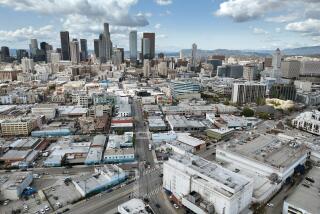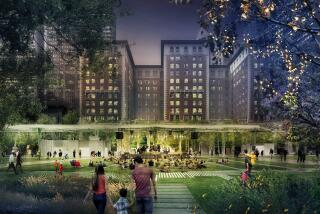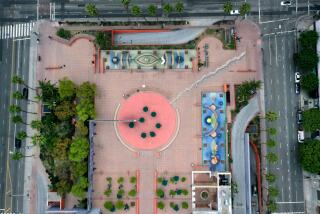Shanghai’s Urban Renewal Expected to Take 40 Years
- Share via
SHANGHAI — China’s largest city has announced plans for an urban renaissance, but says it will take billions of dollars, lots of political savvy and about 40 years.
The Pudong Development Project has won Beijing’s qualified endorsement. Now, Shanghai must persuade foreign investors that there is hope in this troubled metropolis.
Most of Shanghai’s 12 million people and thousands of factories compete for land, air and water in teeming Puxi, on the west side of the Huangpu River.
The development of Pudong, east of the Huangpu, would shift factories, homes and people to the 140-square-mile triangle of land between that river and the Yangtze.
Among things the city plans to do in the next five years are: finish a third bridge across the Huangpu; start construction on a port, power plant and waterworks; open an export processing zone for foreign investors, and complete a highway circling the city.
Work on a subway linking the two sides of the river is to begin this year. Planners envision more highways, another bridge, a second international airport and apartments, hospitals and schools for 1.7 million people in Pudong.
Finance and trade centers, high-tech industries and science centers are planned. Older factories in Puxi are to be moved to Pudong and modernized.
Shanghai’s planners say all that and 40 years to accomplish it will make a modern, efficient city of this former capitalist enclave, which has been the overworked draft horse of Communist China for the last 40.
Zhu Rongji, Shanghai’s energetic and ambitious mayor, said the city will need the equivalent of $10 billion in the first decade.
The national budget has allocated $1.38 billion over the next five years. Much of the rest will have to come from foreign investors and the city itself.
According to the mayor, the climate for investment is “better than at any time in the past and especially better than the time before last June.”
He referred to pro-democracy demonstrations and, in June, 1989, the military crackdown that frightened off many potential investors and drastically slowed loans from the World Bank and other international lenders.
The Asian Development Bank is backing the new Huangpu bridge and a West German consortium has extended credit for more than half the $500 million subway. Such lending, agreed upon before June, will be crucial for the Pudong project.
A Western diplomat in Shanghai did not share Zhu’s optimism about foreign money.
He noted that foreign investment is down sharply thus far this year and that Hong Kong and Taiwan businessmen are more interested in the special economic zones of southern China.
“International lending is blocked up and foreign banks are not exactly doing tricks to increase exposure in China,” he said.
Zhu offers major incentives.
Foreign banks, now allowed to have branches only in the special economic zones, will be invited to Shanghai. Joint ventures will be given tax breaks like those in the zones.
Businesses from abroad will be able to obtain leases of 50 to 70 years on large tracts of land for development, to issue bonds and stocks and conduct stock trading inside and outside China.
Shanghai also is blessed, for once, with strong support from Beijing. Jiang Zemin, Zhu’s predecessor as mayor, is general secretary of the Communist Party and Zou Jiahua, chief of the powerful Central Planning Commission, also is from Shanghai.
Perhaps more important, the conservative politicians now on top in Beijing see Shanghai, with its large state industries, as a counterbalance to capitalism-tainted Canton and the special economic zones in Guangdong and Fujian provinces.
“Even without the fear of creeping capitalism, it would make sense for them to give fewer favors to Guangdong and try to help out the older industrial bases,” the Western diplomat said.
Shanghai formerly had to pay nearly 90% of its earnings to the state, providing about 10% of state revenues. That left too little to repair a rapidly deteriorating infrastructure.
Last year, it was allowed to keep about one-third of revenues, still less than other provinces.
The city “made great contributions to the state in the past” and it is time to return the favor, Zhu said.
Premier Li Peng visited Shanghai in April and endorsed the Pudong project as “an event of important strategic significance both to Shanghai and the whole country.” He said the central government “will provide necessary support and the whole country should give active support.”
Li added, however, that the city “should rely on the support and efforts of the people of Shanghai.”
In his remarks to reporters two weeks later, Zhu said the city could gain $212 million a year just by making its antiquated industrial base more efficient.
He noted that Shanghai’s people “have lots of money in their pockets,” but also quoted a saying that they are “clever but not too wise”--more concerned with short-term profit than long-term interests.
More to Read
Sign up for Essential California
The most important California stories and recommendations in your inbox every morning.
You may occasionally receive promotional content from the Los Angeles Times.










